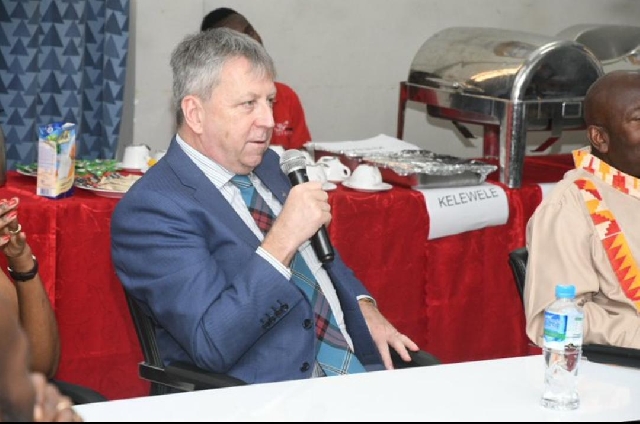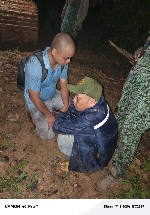University of Edinburgh commits funds for African partnerships
 Professor Sir Peter Mathieson. speaking at the engagement in Accra
Professor Sir Peter Mathieson. speaking at the engagement in Accra
A multi-year commitment to explore innovative educational opportunities for African students and build research partnerships across the continent has been announced by the University of Edinburgh.
Student exchange agreements, fellowship programmes and continent-wide partnerships are at the heart of the University’s commitment to Africa.
The University of Edinburgh-Africa Commitment will focus on supporting Africa’s youth, providing educational opportunities and developing high-quality research and knowledge exchange with African partners.
The announcement was made during a visit to Ghana by a delegation from the Scottish university, led by the University of Edinburgh’s Vice-Chancellor and Principal, Professor Sir Peter Mathieson.
The United Nations (UN) projects that by the end of the century, Africa will be home to 3.9 billion people, some 40 per cent of humanity.
Some of the biggest global challenges, and many of the solutions, will be found in Africa.
The Principal’s African Partnership Fund will initially commit a quarter of a million pounds from the University of Edinburgh each year to build collaborations, potentially supporting research, innovation, teaching and learning and engagement with African colleagues.
The visit underlines the University’s commitment to working collaboratively with African partners, learning from their expertise and experience, and being guided by their priorities and needs.
The University of Edinburgh has a long history of engaging with the African continent.
Edinburgh’s first African graduate, James Africanus Beale Horton from Sierra Leone, completed his Medical Doctorate in 1859.
Edinburgh’s Centre of African Studies (CAS) is one of the largest centres of African studies in Europe.
The University has collaborated on 3,000 research projects with 84 institutions across Africa in the past 10 years, and some 1100 students from 38 African countries study with the University.
During the visit to Ghana, the University of Edinburgh will meet with the African Academy of Sciences, and the West African Centre of Excellence for Cell Biology and Infectious Pathogens (WACCBIP) at the University of Ghana and Ashesi University.
The delegation also hopes to learn from colleagues at Kwame Nkrumah University of Science and Technology (KNUST), the University of Cape Coast and the Mastercard Foundation, all to understand how the University of Edinburgh can best meet the needs of the African continent.
The University of Edinburgh’s Vice-Chancellor and Principal, Professor Sir Peter Mathieson, said: “It is important that our engagement is rooted in listening, learning and commitment.
We can learn from Ghana and we can learn from our African colleagues. By listening and observing, we can form a deeper understanding of the role we can play as an institution when working with partners across the African continent.”
Source: Classfmonline.com/cecil Mensah
Trending News

Interior Minister assures security personnel of improved welfare at joint route march
09:26
AG reveals wontumi submitted fake receipt to secure GH¢4 million EXIM bank loan
12:19
Lands Ministry: 50 large-scale mining companies face license revocation
08:27
“We must exercise our independence”: Djokoto’s bold case for marijuana legalisation
12:13
Vice President pays a working visit to Ministry of Fisheries and Aquaculture
07:11
Accra high court bars journalist from publishing allegations against private individual
12:00
Forestry Commission seizes 3,967 dried shark fins
08:03
AG to prosecute Wontumi Farms, directors over GHS24m EXIM Bank fraud
11:54
Forestry Commission team arrest 11 persons in Pra Anum forest reserve for illegal mining
06:50
Constitution Review Committee to present its final report to President Mahama today – Kwakye Ofosu
09:41



